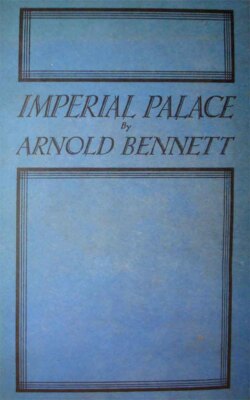Читать книгу Imperial Palace - Arnold Bennett - Страница 34
На сайте Литреса книга снята с продажи.
Chapter XVI – ESCAPE
ОглавлениеI
At ten minutes to eleven Evelyn said that urgent work compelled him to leave them. He had not asked Gracie to dance again, and she had given not the slightest sign that she wished him to do so. Time had passed quickly. Evelyn had been relating the somewhat melodramatic professional history of Maître Planquet. Also quite a number of minutes had gone to the business, suddenly undertaken by Gracie, of writing a note and sending it across to Nancy Penkethman and obtaining a reply.
“But you’re coming upstairs to my little party later,” she said to Evelyn with a confident inviting smile. “You coming, daddy?” she added negligently to Sir Henry.
“No,” said Sir Henry, promptly, positively and curtly.
Gracie kept her smile waiting for Evelyn’s answer. A smile which could not reasonably have been described otherwise than as irresistible. Since the visit to the kitchens her demeanour to the guest had been even more exquisitely agreeable than before. Forgotten, apparently, was the short passionate outburst concerning work!
“I’m afraid I mustn’t,” Evelyn said quietly. He had no intention whatever of going to her party, to meet people whom he did not personally know, and of the frivolous, notorious sort, which he had no desire to know. Indeed he had been wondering how a unique girl such as Gracie, and a public power such as Lord Watlington, could have arrived at intimacy with smart, merely ornamental futilities such as Nancy Penkethman, Lady Devizes and the two tall Cheddars. Further, his sense of proportion, of the general plan of a day and of a life, made him hostile to the very idea of these suddenly, capriciously arranged festivities. Still further, he was tired, and he thought that Gracie ought to be tired too.
But he had a far stronger motive for refusing. He emphatically did not want to placard himself too strikingly with a famous girl like Gracie. Already (he recalled again and again) the entire upper-staff of his hotel was certainly aware that he had taken her to Smithfield at an ungodly hour that morning, and that immediately on their return to the Palace he had shown her over parts of the hotel. Also that she had been enquiring for him in the afternoon and had asked for the number of his car. And had he not dined with her that night? Was he not still, in fullest publicity, sitting at her father’s table? Had she not danced with him? Had he not exhibited to her the kitchens of Maître Planquet? Impossible that he should add fatuity to indiscretion, and increase tittle-tattle, by going to her infantile party, which probably he would not be permitted to leave till 2 or 3 a.m.! And why should he imperil his next day’s work by turning night into day? He was a serious man, admired, loved and feared by other serious men. He hated any form of notoriety for himself. And he would not yield to this bewildering, lovely chit.
“Oh! But you can’t say ‘No,’ ” Gracie protested sweetly.
“Afraid I must,” Evelyn insisted, and rose to depart. “So many thanks for your hospitality,” he said in a formal tone, addressed equally to father and daughter.
“But I’ve told them you’re coming!” said Gracie.
“Whom?”
“Nancy Penkethman. In my note. I’ve promised you to them.”
Evelyn laughed a little, saying: “A young woman as beautiful as you are is entitled to break any promise. I’m so sorry. Good night. I’m fearfully sorry.”
“I say, Orcham,” Sir Henry stopped him.
“Yes?”
“You aren’t forgetting my message to you this morning?”
Evelyn acted shame and alarm.
“Upon my soul I was!” he exclaimed. “Old age! Old age! Do forgive me. You wanted to see me—wasn’t it?”
“I’d like to have five minutes some time.”
“You and your five minutes!” thought Evelyn. “Do you imagine I can’t see through you?” And aloud: “I’ll be delighted if I can be of any use.”
“I’m busy to-morrow morning,” said Sir Henry.
“And my afternoon’s full up,” Evelyn instantly retorted; and added, in a tone intentionally sardonic: “Our Annual Meeting.”
“Oh, really! Well, there’s no frantic hurry,” said Sir Henry, very calm. “Shall we say day after to-morrow, or the day after that. I shall be here for a few days, might be here for a few weeks.” Evelyn drew out his pocket engagement-book and they fixed a rendezvous.
“It’s coming at last,” said Evelyn to himself as he walked away. “As if the man didn’t know I knew he knew all about the shareholders’ meeting!” He was only sardonic, not apprehensive.
As for Gracie, the girl’s smile, at parting, had lost none of its delicious, acquiescent sweetness. She might be erratic, wayward, unpredictable; but she had manners.
Evelyn went straight to his private office, satisfied with his own fortitude, but uncomfortable. He saw a thin line of light under the shut door. Miss Cass, hatted and coated, bag in one hand, was tidying his great desk. He was not expected in his office that night, and in the morning he liked the desk to be absolutely clear, save for a bottle of mineral water and a glass and some flowers.
“Anything urgent?” he demanded.
“No, sir. Nothing.”
The next moment Miss Cass was gone, having shown her usual reluctance to quit work. Three days a week she enjoyed evening-duty till 11 p.m.—for the hidden life of the Palace, never dreamt of by visitors, extended daily over a period of sixteen hours, and more—but Miss Cass would willingly have served every night till eleven o’clock, or even twelve; indeed, she hated to leave her subaltern in command of the Director’s sacred welfare.
